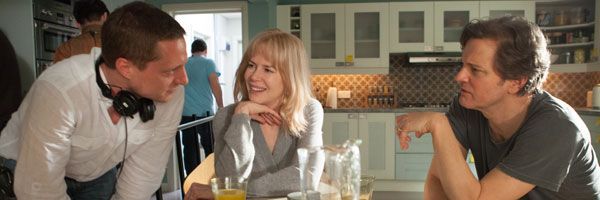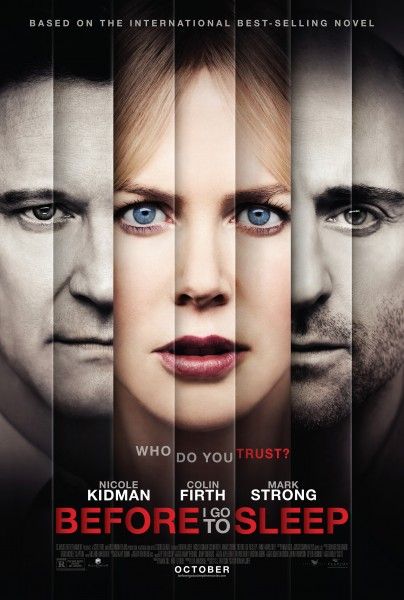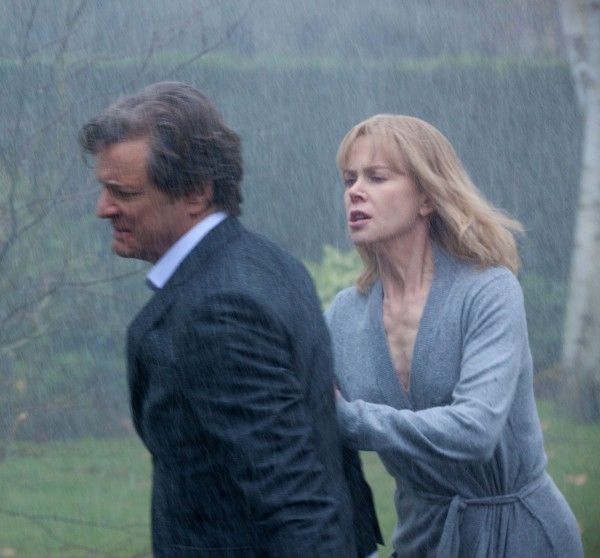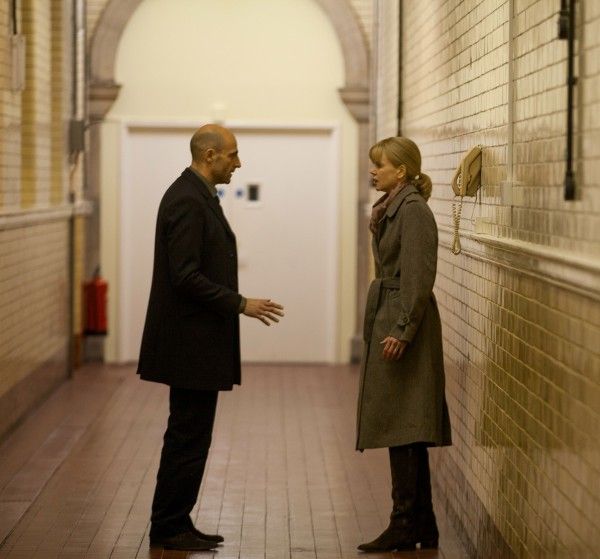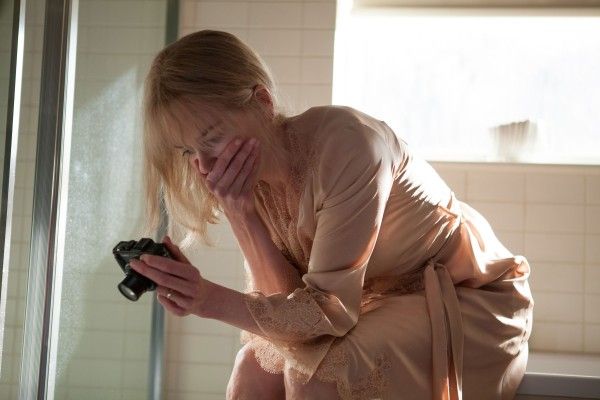Writer-director Rowan Joffe’s adaptation of S.J. Watson’s best-selling novel, Before I Go to Sleep, is a taut, stylish psychological thriller about an amnesiac, Christine Lucas (Nicole Kidman), who awakens each morning with no recollection of her past. She struggles to comprehend the emotional impact of her always-new reality, but as fragmented memories begin to resurface, she starts to question everything she thought she knew about her life. Opening October 31st, the film also stars Colin Firth and Mark Strong.
In an exclusive interview, Joffe spoke about how the novel first came to his attention, why he found it a riveting page turner, the journey from page to screen, the narrative device he adapted to film from the novel, why he feels emotion is the key to keeping a psychological thriller fresh and engaging, how Kidman’s movie star status was instrumental in getting the film greenlit, how Firth and Strong’s roles reveal a different side of them than we’re used to seeing, what he learned from Colin and Nicole about making a good thriller, the 70’s films that inspired him, and his upcoming projects including an adaptation of Neil Gaiman’s novel The Graveyard Book for Disney and developing his own TV show called Tin Star. Check out our interview after the jump.
Question: Can you talk about how this project first came together?
ROWAN JOFFE: I was given a manuscript of the book, a proof by a television producer called Liza Marshall who I’ve worked with before. That’s actually really important, because when I got the manuscript, there was no cover. There was nothing to tell me that I was reading a thriller. So, I started reading what felt like the memoir of a woman with a brain injury. My mum had had a brain injury about 10 years earlier. So it felt like it was a straight drama in novel form. Slowly her paranoia became more prevalent and it turned out there really was a conspiracy. It was a complete shock to me because I didn’t know I was reading a thriller. From that moment, I was hooked. I was on holiday after making my first feature and I told my wife the story out loud, then and there, as soon as I put it down. I noticed a lot of the family had stopped splashing around [in the pool] and had come to listen because it’s such a good story.
What was the journey like from page to screen?
JOFFE: I’ve adapted a few novels now for the screen. I suppose the last one that audiences will be familiar with was a George Clooney movie called The American. In some ways, adapting a novel is easier than writing an original screenplay because a writer has already done a lot of the work for you. In some ways, it’s fiendishly difficult if not impossible. For example, how do you convey a character’s thoughts? This is something novelists rely on all the time. As a screenwriter, that very useful narrative tool is taken away from you. It’s like suddenly you’re in a race with only one leg, because you can only show what a character does or says and their interior life has to be guessed at. So that’s a huge handicap. There’s no simple formula for how you crack that. It’s an act of trust. You just hope that enough rewrites will get you there in the end. I’m guessing this did, and my measure for that is the novelist is very happy with the film, and in fact can no longer tell which ideas are mine and which are his, which I think is a good test.
What narrative devices were you able to bring from the novel into the film?
JOFFE: In the book, she keeps the diary, and that makes sense because it’s a written device for a written form. So we just did the math and thought, “Well let’s use a visual device for a visual performance.” It presented some technical challenges during shooting because we needed to cut away to the camera that she was making recordings on, which meant that we actually had to have a separate digital camera that we would re-record a lot of her entries on. Because the timeline in the story is already complicated, it was quite difficult to keep everyone on track in terms of what we were recording when. It was particularly challenging for Nicole, not only to be familiar with this device and to treat it like another limb, but also to be aware of what she knew about her story at any given point in the day. Unlike the character, she didn’t have the camera there as a simple answer to the question, “What do I know?” She had me, and fortunately I think I got it right most of the time.
Today’s audiences are very sophisticated, how do you keep a psychological thriller like this fresh and engaging but also keep your audience guessing?
JOFFE: Emotion is the key for me. I think if you really care about the characters and you’re emotionally invested in what happens to them, then those characters under threat produce an instinctive sense of threat in the audience as if you yourself are under threat. You’re constantly wondering what’s about to happen. In a psychological thriller, you can keep an audience asking questions like, “Have I been told the truth? If I haven’t, why haven’t I? Which one of the two characters that I’m relying on completely can I trust?” We play a particular game, swinging the pendulum in this movie. We build mistrust around a certain character and then he wins that trust back. And that’s faithful to the novel. At some points you think this is a woman with a brain injury who is being paranoid, and at some points you think that actually they really are out to get her. You’re never quite sure which is which. I think that device is a traditional device. It’s used in Rosemary’s Baby. It’s used in Hitchcock. And it still works today.
When you’re trying to build tension and sustain the pace in a film like this, how can you tell if it’s working? As you’re assembling the film, do you construct several sequences, look at it, and then maybe go back and do some re-editing?
JOFFE: A lot of that process happens in the screenwriting stage. And the reason why a lot of it happens at that stage is that it’s easier to rewrite a script than reshoot and recut a movie. It’s less expensive and it’s also practically easier. So, many, many drafts is the basic answer to that question. It’s rewriting, rewriting and rewriting. I think T. S. Eliot said that writing is in the rewriting. When you have something in the cutting room that you’re ready to show, you show it and then the art becomes which criticisms are helpful and valid and which aren’t. So, you really look for the criticisms that are cropping up most often.
What did Nicole Kidman, Colin Firth and Mark Strong bring to their roles?
JOFFE: I have to be slightly careful at answering that because I don’t want to give the plot away. I think what Nicole brought to the project was a long list of things. First of all, she was a big enough star that she got the movie greenlit and that’s something that cannot be left unacknowledged. Second of all, I think she brought a scale, a kind of cinematic scale, to the piece because it’s a chamber piece. It’s a three-hander. It’s set in a suburban home. Having Nicole in it made it feel cinematic, because there is something cinematic about her, herself, and also the associations we have with her. She’s a movie star so you feel like you’re going to see a movie. I think what Colin and Mark do, and this is where I have to be careful, is they both deliver roles the likes of which neither of them have ever delivered before and make it particularly challenging to figure out who’s trustworthy in the movie and who isn’t.
What have you learned in the process of making this film?
JOFFE: (Laughs) A lot. I’ve learned about the shifting sands of the industry. This is not the same industry now as I thought it was when I started making the movie. It is increasingly difficult to get movies that aren’t $150 million monster movies or superhero franchises or have a vast ensemble cast of Oscar potential winning actors. It’s hard to get those audiences out to the multiplexes now. And that’s for a whole multitude of reasons. It’s to do with the internet. It’s to do with television. It’s to do with things I don’t understand. People used to make movies like this more often and there aren’t that many of them around now. And in terms of just how to make a really good thriller, the thing that I’ve learned is something that Colin and Nicole taught me, which is that if your character isn’t scared, the audience won’t be either. And so, I had to make sure during every stage of the process that I was giving them both on the page and on set the opportunity to feel a sense of threat.
Which films do you remember watching that inspired and influenced you and made you want to become a filmmaker?
JOFFE: I grew up watching the films of the 70’s, which I think is probably the greatest era in filmmaking overall. So, movies like The Parallax View and Three Days of the Condor and Rosemary’s Baby and Chinatown and Polanski’s first movie, The Knife in the Water. Those set the scene for me in terms of great thrillers. I mean, I watched The French Connection the other night and I thought even by today’s standards that car chase is inimitably brilliant. I don’t think there will ever, ever be a greater one. So the 70’s set the bar high for me. I think the thing that I’m saddest about is how much of movie production now is done digitally. It is not the direct result of the ingenuity of the director and the physical resourcefulness of the crew like it was when Kubrick made 2001 and those sets were actually built. You have a vision and a bunch of teenage kids who you never meet, who work for a VFX company, make that vision come true. You give notes and you say what you like and what you don’t like, but there’s a disconnect there that I think is ultimately making everything look more and more similar, sort of ergonomically homogeneous. So, all my filmmaking passion is to do with the history of film from the 70’s back in time.
You have a number of projects in development. Which ones are you most excited about?
JOFFE: I am currently adapting a Neil Gaiman novel called The Graveyard Book for Disney and for a fantastic producer called Gil Netter. I am also developing my own TV show which is called Tin Star (a contemporary Western) and that’s for a British network called Sky Atlantic. And the reason why that’s important is that I think there is a chance to tell certain kinds of story on the small screen now that there isn’t in the multiplexes anymore. So I can find more authorship in television than I can in moviemaking, which is under a lot of commercial pressure at the moment.
I heard you might be adapting King, Queen, Knave based on the Vladimir Nabokov novel. Is that still happening?
JOFFE: It’s just a novel I love. It would make a wonderful art house movie. I’d struggle to find anyone to give me the money to make it because I’m not sure if there’s an audience for a movie set in Berlin in the 1920’s, but I would love to do that.
What about Agent Zigzag which is a comedy?
JOFFE: Agent Zigzag is actually the adaptation of a brilliant British journalist’s true story of a World War II spy. That is sitting in what’s known as the development wilderness and has been ever since Mike Newell, the director, went off to do other things.
What’s happening with your horror film, Charles Fort?
JOFFE: Charles Fort is a deal that I have as a screenwriter with Universal Studios and something that is ongoing. I’m writing that at the moment.
Is Robert Zemeckis producing?
JOFFE: Yes.
And then you have Three Seconds, a crime drama?
JOFFE: Three Seconds, that script was something that I finished and passed on before I started making this movie. I’m tracking it and I’m hopeful something will happen, but who knows.
What about the Wikileaks/HBO Project?
JOFFE: Unfortunately, we lost the race to the DreamWorks movie, which was a far less sophisticated version of the story than ours was going to be. But that’s probably why we lost the race.
You mentioned your love of 70’s films. Are you a Star Wars fan?
JOFFE: (Laughs) Oh definitely! I watched The Empire Strikes Back last week.
How many times have you watched it?
JOFFE: Oh, double figures!

